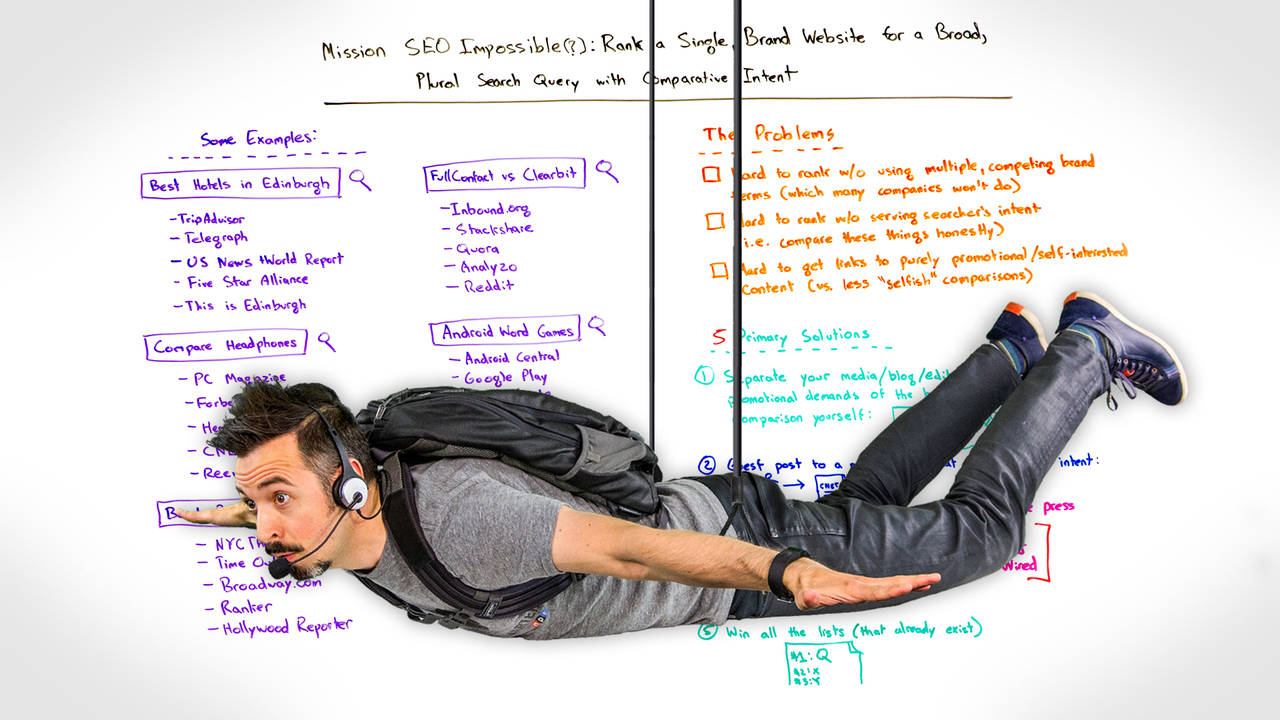Mission SEO Impossible: Rank a Single Brand Website for a Broad, Plural Search Query with Comparative Intent - Whiteboard Friday. In today's Whiteboard Friday, Rand explains the challenges and outlines five solutions that can help you begin ranking for those high-value comparative terms. But that is nearly impossible, because if you look at the front page of results, all the folks there are comparative types of sites. There are lots of comparative types of searches like this. So if you have an individual hotel website or an individual headphone website, an individual Android word game, that's not actually answering the searcher's intent. We even rank for a lot of SEO software types of queries that are clearly comparative, because we have that editorial independence in our editorial content. So if you can go out to the websites that are already listed here or ones like them, those independent, editorial, media-driven properties and say, "Hey, I will contribute to this as an independent author or writer. Yes, I work for this brand, but I think when you see my content, you will see that I've done my research and I am not biased." You can go and contract a single expert in the field, someone that you trust to do a great job, and you can say, "Hey, you already contribute to CNET, you already contribute to Time Out, you're already a contributor to Tom's Guide or Android Headlines or whatever it is. The challenge is it's not just a marketing or an SEO or a content problem.

Competing with comparison sites in the SERPs can feel like a losing game, but it doesn’t have to. In today’s Whiteboard Friday, Rand explains the challenges and outlines five solutions that can help you begin ranking for those high-value comparative terms.


Click on the whiteboard image above to open a high-resolution version in a new tab!
Video Transcription
Howdy, Moz fans, and welcome to this impossible edition of Whiteboard Friday. This week we’re chatting about one of the toughest things that a lot of SEOs face, which is trying to rank for these specific types of queries that have a plural comparative intent behind them.
Some examples:
So I’ll give you a bunch of examples just to set the stage for this.

Let’s say I’m a hotel operator in Edinburgh, and I run one individual hotel, maybe a boutique hotel, and I want to rank for “best hotels in Edinburgh.” But that is nearly impossible, because if you look at the front page of results, all the folks there are comparative types of sites. They’re media properties. They’re hotel comparison shopping sites. So it’s TripAdvisor and Telegraph and US News & World Report, and This is Edinburgh, which is a media magazine there.

If I want to rank for “compare headphones” and I am the maker of one particular type of headphones, it’s incredibly difficult to outrank a PC Magazine, Forbes, HeadphonesCompare.com, CNET, Reevoo. This is an incredible challenge, right?

“Best Broadway shows,” if I’m operating a new Broadway show and I want to come up for this, which would be really meaningful for my Broadway show, which, by the way, most of them lose money. It’s an incredibly tough business. NYC Theatre, Time Out, Broadway.com, how do I get in there?

Or let’s say I’m in the software field. I’m FullContact, and I want to rank for “FullContact versus Clearbit.” There are lots of comparative types of searches like this. If you search for your brand name or your product’s brand name and “versus,” you’ll almost certainly come up with a bunch of suggestions. Well, it turns out neither FullContact nor Clearbit rank for this type of query. It’s Inbound.org and StackShare and Quora and Analyzo.

For “Android word games,” if I’ve come out with a new word game, it could be huge for me to rank for this term. But you know what? It’s going to be Android Central and Google Play, Tom’s Guide, Android Headlines, right?

If I have a new TV comedy, it would be fantastic because a lot of people are searching for “TV comedies” or “TV comedies on Netflix” or what have you. If I was Netflix or if I were some of these folks, I would love to come up here. But instead, it’s UPROXX and Ranker and IMDB. It’s comparative media sites almost always.
The problems
So what do we do? The first step is we have to identify the problem, like what is fundamentally going on. Why is it that these types of sites consistently outperform? This is not universal, but it’s close enough, especially on competitive head terms, like some of these, where it gets close to impossible or feels that way.
I. It’s really tough to rank without using the right words and phrases.
If you are a boutique hotel in Edinburgh, you might not be very comfortable using words like Hilton or Marriott or some of these other words that are branded terms that are owned by your competition. There could be legal issues around that, but it might…

COMMENTS